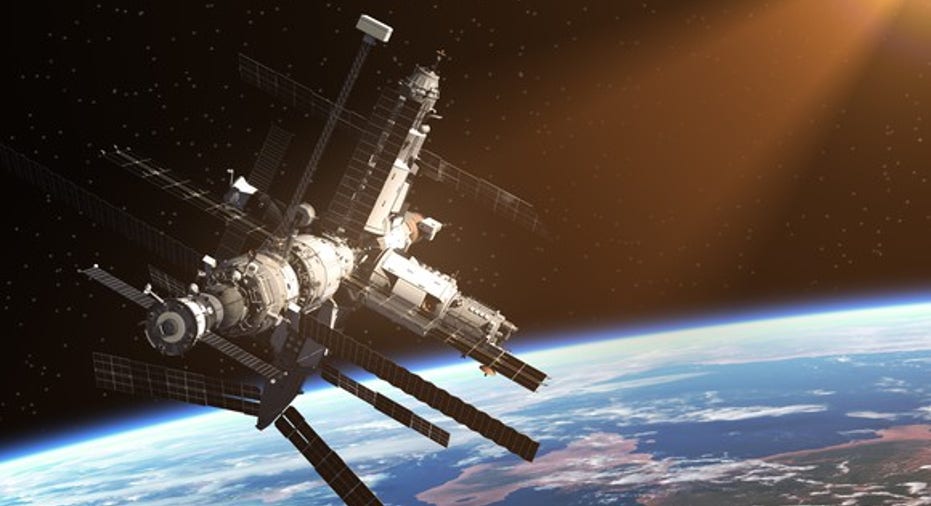Who Will Buy the International Space Station?

For sale: One space station. Slightly used. Great view of Central Park (and a lot of other parks). Image source: Getty Images.
As early as 2023, and by 2024 at the latest, Russia intends to abandon the International Space Station. And not only that, they're taking their half of the station when they go.
That leaves America and its astronauts in somewhat of a bind because, as Russian Deputy Prime Minister Dmitry Rogozinrecently pointed out, "the Russian segment [of the ISS] can exist independently from the American one, but the American segment cannot exist without the Russian."
So, what will America do when its most important roommate moves out of the space apartment next decade?
How to make the rent?
Earlier this year, we explored a few possibilities for how NASA might respond to such a scenario. Last week, NASA floated a plan of its own.
"NASA is trying to develop economic development in low-earth orbit," explainedNASADeputy Associate Administrator for Exploration Systems Development Bill Hill. One step in that process was privatizing the mission of sending supplies up to the ISS (privately held Sierra Nevada Corp, SpaceX, and Orbital ATK (NYSE: OA) recently won contracts to continue this mission). Another step, due to begin any year now, will be to have SpaceX and Boeing (NYSE: BA) begin taxiing astronauts up to the station on NASA's behalf.
The next logical step, therefore, might be "to hand the space station" over entirely to "a commercial entity" to run -- and, presumably, to have said buyer pick up the tab for building new space station sections to replace the ones Russia will be removing in 2024. Such a move would free up as much as $4 billion annually, or about 20% of the agency's funding, for NASA to spend on its planned mission to Mars.
New roommates!
If that's truly NASA's plan, then pretty soon, scientific research in low earth orbit will become a private, for-profit venture. It's time for investors to start thinking about who might profit from that.
There are the usual suspects, of course. Sierra Nevada, SpaceX, Orbital ATK, and Boeing have all proven themselves to be favored contractors at NASA, and they would presumably be leading candidates to acquire the ISS if it goes up for sale. Other companies (Lockheed Martin (NYSE: LMT), for example) have played similarly leading roles in spaceflight in the past, while still others, such as Bigelow Aerospace, are showing great promise as innovative builders of orbital real estate.
Conceivably, the ISS's new owner might be not just one single commercial entity, but a consortium of several companies all contributing the bits and pieces they do best (much as the ISS was originally built by several countries contributing specific modules).
Read the fine print
Is that how things will work out next decade? Possibly -- in fact, I'd go so far as to say "hopefully." If Russia's departure will render the ISS uninhabitable, it would be an absolute shame to see the more than $100 billioninvested to date in the station fall to Earth and burn up in the atmosphere. Far better to sell it off to private enterprise and allow them to get more use out of it.
Details will of course need to be ironed out with America's non-Russian ISS partners -- the European Space Agency, Canadian Space Agency, and Japan Aerospace Exploration Agency among them. Presumably, though, these agencies would likewise see the advantages in preserving their investments even under private management -- and perhaps getting a few dollars back on them.
For that matter, these various space agencies -- and the Chinese, and the Indians, and maybe the Russians as well -- are all continuing to develop their own independent space programs. Deals could probably we worked out guaranteeing space ships from former (and future) ISS users the right to dock with a privatized space station for resupply, refueling, or R&R visits. That would provide a secure revenue stream for the station's new owners, encouraging higher bids from prospective buyers and incentivizing the present owners to green-light a sale as well.
In short, NASA's plan to sell the ISS has merit. And since such a sale would set a further legal precedent for the commercialization of space, it's a development all investors in the new space industry should applaud.
A secret billion-dollar stock opportunity The world's biggest tech company forgot to show you something, but a few Wall Street analysts and the Fool didn't miss a beat: There's a small company that's powering their brand-new gadgets and the coming revolution in technology. And we think its stock price has nearly unlimited room to run for early, in-the-know investors! To be one of them, just click here.
Fool contributorRich Smithdoes not own shares of, nor is he short, any company named above. You can find him onMotley Fool CAPS, publicly pontificating under the handleTMFDitty, where he's currently ranked No. 301 out of more than 75,000 rated members.
The Motley Fool recommends Orbital ATK. Try any of our Foolish newsletter services free for 30 days. We Fools may not all hold the same opinions, but we all believe that considering a diverse range of insights makes us better investors. The Motley Fool has a disclosure policy.



















